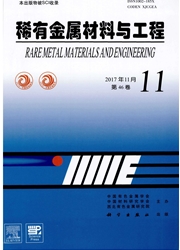

 中文摘要:
中文摘要:
在等径通道角挤压法(ECAP)的基础上,通过对挤压试样的设计,提出一种铜包裹着钛棒的ECAP法,最终成功地制备了1、2、4道次超细晶钛,采用这种方法可以在很小的挤压力下实现UFG-Ti的制备。不但有效抑制了钛棒的碎裂,还避免了挤压杆失稳。通过光学显微镜(OM)、扫描电镜(SEM)、透射电镜(TEM)观察了各道次UFG-Ti的微观组织,并利用显微硬度计研究了其硬度变化。利用万能试验机和SHPB系统在不同应变率下进行了压缩试验。结果表明,常温下ECAP处理后纯钛的晶粒明显细化,力学性能显著提高,在准静态和动态压缩载荷作用下其流动应力(10%应变处)分别提升了71%和86%。最后研究了UFG-Ti的应变率敏感性,发现UFG-Ti的流动应力对应变率具有较低的依赖性。
 英文摘要:
英文摘要:
Based on equal channel angular pressing(ECAP), we designed the extrusion sample and proposed a new ECAP method with titanium rod packaged in copper cover. With this method we prepared UFG-Ti for 1, 2, 4 passes at room temperature. The extrusion force during ECAP could be controlled at low level, which effectively suppressed the fragmentation of the titanium sample and avoided the instability of the extruded bar. The microstructure of the prepared UFG-Ti was observed using the optical microscope(OM), scanning electron microscope(SEM) and transmission electron microscope(TEM). Compression tests were performed on the UFG-Ti at different strain rates by the universal testing machine and the SHPB system. Results show that titanium grains are remarkably refined with the proposed ECAP method, and the improvement of mechanical properties caused by grain refinement is significant. The flow stress of 4-pass UFG-Ti is improved by 71% and 86% under quasi-static and dynamic compression load, respectively. At last, we studied the strain rate dependence of the UFG-Ti and find that the UFG-Ti exhibits low rate sensitivity.
 同期刊论文项目
同期刊论文项目
 同项目期刊论文
同项目期刊论文
 New criterion for evaluating influences of stress uniformity on results in split Hopkinson bar tests
New criterion for evaluating influences of stress uniformity on results in split Hopkinson bar tests Compressive behavior and rate-controlling mechanisms of ultrafine grained copper over wide temperatu
Compressive behavior and rate-controlling mechanisms of ultrafine grained copper over wide temperatu A numerical study of microstructure effect on adiabatic shear instability: Application to nanostruct
A numerical study of microstructure effect on adiabatic shear instability: Application to nanostruct The effect of temperature on mechanical behavior of ultrafine-grained copper by equal channel angula
The effect of temperature on mechanical behavior of ultrafine-grained copper by equal channel angula Influence of short time annealing on strain hardening rate and flow stress of ultrafine grained mate
Influence of short time annealing on strain hardening rate and flow stress of ultrafine grained mate Dynamic tensile behavior of two-dimensional carbon fiber reinforced silicon carbide matrix composite
Dynamic tensile behavior of two-dimensional carbon fiber reinforced silicon carbide matrix composite Atomic simulations of the effect of twist grain boundaries on deformation behavior of nanocrystallin
Atomic simulations of the effect of twist grain boundaries on deformation behavior of nanocrystallin Critical issues related to instrumented indentation on non-uniform materials: Application to niobium
Critical issues related to instrumented indentation on non-uniform materials: Application to niobium Statistic derivation of Taylor factors for polycrystalline metals with application to pure magnesium
Statistic derivation of Taylor factors for polycrystalline metals with application to pure magnesium Experimental investigation on strain rate sensitivity of ultra-fine grained copper at elevated tempe
Experimental investigation on strain rate sensitivity of ultra-fine grained copper at elevated tempe 期刊信息
期刊信息
